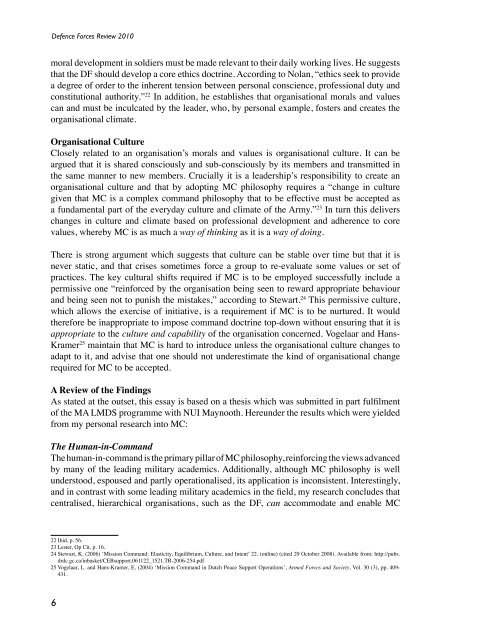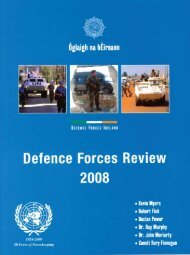Defence Forces Review 2010
Defence Forces Review 2010
Defence Forces Review 2010
Create successful ePaper yourself
Turn your PDF publications into a flip-book with our unique Google optimized e-Paper software.
<strong>Defence</strong> <strong>Forces</strong> <strong>Review</strong> <strong>2010</strong>moral development in soldiers must be made relevant to their daily working lives. He suggeststhat the DF should develop a core ethics doctrine. According to Nolan, “ethics seek to providea degree of order to the inherent tension between personal conscience, professional duty andconstitutional authority.” 22 In addition, he establishes that organisational morals and valuescan and must be inculcated by the leader, who, by personal example, fosters and creates theorganisational climate.Organisational CultureClosely related to an organisation’s morals and values is organisational culture. It can beargued that it is shared consciously and sub-consciously by its members and transmitted inthe same manner to new members. Crucially it is a leadership’s responsibility to create anorganisational culture and that by adopting MC philosophy requires a “change in culturegiven that MC is a complex command philosophy that to be effective must be accepted asa fundamental part of the everyday culture and climate of the Army.” 23 In turn this deliverschanges in culture and climate based on professional development and adherence to corevalues, whereby MC is as much a way of thinking as it is a way of doing.There is strong argument which suggests that culture can be stable over time but that it isnever static, and that crises sometimes force a group to re-evaluate some values or set ofpractices. The key cultural shifts required if MC is to be employed successfully include apermissive one “reinforced by the organisation being seen to reward appropriate behaviourand being seen not to punish the mistakes,” according to Stewart. 24 This permissive culture,which allows the exercise of initiative, is a requirement if MC is to be nurtured. It wouldtherefore be inappropriate to impose command doctrine top-down without ensuring that it isappropriate to the culture and capability of the organisation concerned. Vogelaar and Hans-Kramer 25 maintain that MC is hard to introduce unless the organisational culture changes toadapt to it, and advise that one should not underestimate the kind of organisational changerequired for MC to be accepted.A <strong>Review</strong> of the FindingsAs stated at the outset, this essay is based on a thesis which was submitted in part fulfilmentof the MA LMDS programme with NUI Maynooth. Hereunder the results which were yieldedfrom my personal research into MC:The Human-in-CommandThe human-in-command is the primary pillar of MC philosophy, reinforcing the views advancedby many of the leading military academics. Additionally, although MC philosophy is wellunderstood, espoused and partly operationalised, its application is inconsistent. Interestingly,and in contrast with some leading military academics in the field, my research concludes thatcentralised, hierarchical organisations, such as the DF, can accommodate and enable MC22 Ibid, p. 56.23 Lester, Op Cit, p. 16.24 Stewart, K. (2006) ‘Mission Command: Elasticity, Equilibrium, Culture, and Intent’ 22. (online) (cited 29 October 2008). Available from: http://pubs.drdc.gc.ca/inbasket/CEBsupport.061122_1521.TR-2006-254.pdf25 Vogelaar, L. and Hans-Kramer, E. (2004) ‘Mission Command in Dutch Peace Support Operations’, Armed <strong>Forces</strong> and Society, Vol. 30 (3), pp. 409-431.6
















